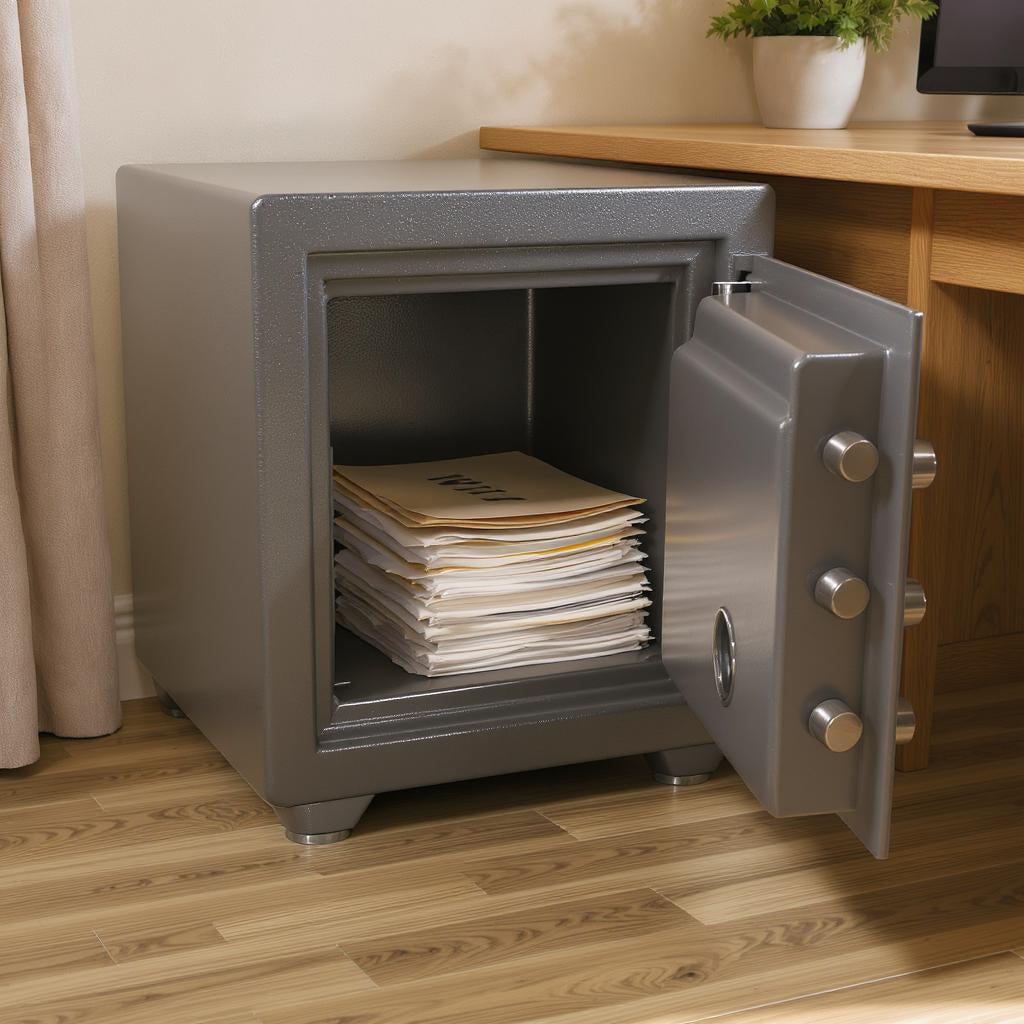Legal paperwork isn’t something you want to leave lying around. Protecting your contracts, property deeds, wills, or sensitive case files from fire, theft, and water damage is essential.
If you're wondering what type of safe is best for storing legal documents at home or in your office, here's a breakdown of what to look for and which options work best.
Why Legal Documents Need a Proper Safe
These papers are often irreplaceable. Losing them to fire or theft can cause major setbacks, legal trouble, or financial loss. Unlike jewellery or tech, legal documents don’t usually have resale value—but that doesn’t make them less important.
Risks include:
-
Fire damage (especially in older properties or offices)
-
Water damage from leaks or sprinklers
-
Theft, particularly in shared workspaces or during a break-in
-
Misplacement or unauthorised access
Using a drawer or filing cabinet just isn’t enough. You need a safe designed to protect paper over time.
Key Features to Look For
When choosing a safe for legal documents, prioritise these features:
1. Fire Protection
-
Look for a fire rating of at least 60 minutes for paper
-
Ensure it's certified to protect contents at internal temps below 177°C (paper ignites at 233°C)
2. Interior Layout
-
Needs to fit A4, legal, or foolscap documents flat
-
Shelving, file racks, or vertical slots can help
3. Lock Type
-
Digital keypads offer fast access
-
Dual locks or biometric options add extra security
4. Size and Capacity
-
Allow room for expansion—contracts and files build up over time
-
Choose litres based on your filing needs (20L+ for home, 50L+ for offices)
5. Burglary Resistance
-
For shared offices or high-risk areas, choose a safe with a Eurograde rating
-
Solid steel body, relocking mechanisms, and bolt-down features are key
Best Safe Types for Legal Documents
Not all safes are built for documents. Here are the best types to consider:
1. Fireproof Home Safes
-
Great for storing wills, birth certificates, and property deeds
-
Usually compact (15-30L) and easy to hide
-
Can be bolted inside wardrobes or cupboards
2. Fire-Rated Filing Cabinets
-
Perfect for law firms, accountancy practices, and estate agents
-
Designed to hold files vertically in standard suspension folders
-
Come with 1 to 4 drawers, each insulated separately
3. Burglary & Fireproof Safes
-
Ideal for legal practices needing protection from both fire and break-ins
-
Eurograde-rated with fire insulation
-
Come in a range of sizes with internal organisation features
4. Wall Safes
-
Useful for discreet document storage at home
-
Limited in size but can still hold key files and a few folders
-
Best when installed behind panels or artwork
5. Floor Safes (with Fire Lining)
-
Installed under concrete or solid flooring
-
Offer excellent concealment and good resistance
-
Some models come with fire-resistant inserts or cases
Home vs. Office Use: What’s the Difference?
For Home Use:
-
Smaller size usually sufficient (20-40L)
-
Fireproofing is a priority
-
Hideability matters more than burglary rating in low-risk areas
For Office Use:
-
Larger capacity needed for multiple files
-
Fire and theft protection both important
-
Insurance compliance may require certified models
Shared Homes or Offices:
-
Consider safes with dual access control (e.g. two codes or key+code)
-
Internal compartments can help restrict access
Installation and Placement Tips
Where to put your document safe:
-
Inside a locked cupboard
-
In the back of a wardrobe
-
Under the floor (for long-term storage)
-
Mounted on a wall behind a false panel
-
In an office corner bolted to the floor
What to avoid:
-
Visible spots like under desks or in hallways
-
Damp or unventilated spaces (can damage paper)
-
Rooms with high foot traffic
Pro tip: Use silica gel or moisture absorbers inside the safe to protect paper over time.
What to Store in the Safe
Not sure what documents deserve protection? Here’s a quick checklist:
-
Wills, powers of attorney, and birth certificates
-
House deeds and tenancy agreements
-
Business contracts and client documents
-
Legal case files and confidential reports
-
Tax records, company formation documents
-
Insurance policies and claims history
Digital copies on hard drives or USBs? Store them alongside your files in a fireproof model rated for digital media.
Final Thoughts
Legal documents aren’t flashy, but they’re some of the most important things you own. A proper safe protects them not just from theft, but from fire, water, and loss.
Whether you're working from a home office or running a busy practice, investing in the right document safe is about more than just security—it’s about being prepared.

